Extract from The Guardian
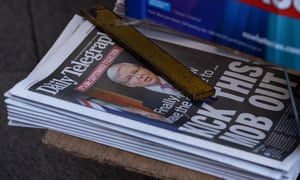
News Corp has a distinctive culture – tribal, aggressive and centred
around powerful editors – according to the accounts of former employees.
Peter Fray, the former Sydney Morning Herald editor and former deputy editor at the Australian describes the difference between the news organisations this way; “Working for the Australian reminded me of being at the SMH when the Fairfax family controlled it.
“In both instances, you felt you were part of a particular tribe where the norms and values were set by the chief and their key lieutenants. Of course, Tribe Fairfax is not Tribe Murdoch. The Oz is not the SMH. But as with any tribe there are set rules and rites, mostly unspoken.”
Another former News Corp insider described it as an aggressive, masculine culture although there are also women in News Corp’s executive and editor ranks.
“Alpha males are selected as editors. It’s a real big swinging dicks culture … With the editors it’s often about the relationship with Murdoch himself: who can be the ballsiest, toughest, cheekiest editor at the next editor’s conference in Belize or wherever.”
This year it will probably be Christopher Dore, the editor of the Daily Telegraph, after the paper claimed the scalp of the deputy prime minister, Barnaby Joyce, by revealing he had left his wife and was having a baby with his media adviser Vikki Campion.
Or perhaps it will be Paul Whittaker at the Australian for his diligence in pursuing the former prime minister Malcolm Turnbull over his energy policy.
The culture of News has been described by some past executives and former staff as “bullying” and “vindictive”. Some embrace it and become spear carriers for their editors – and usually rise up the ranks. Others struggle with what is expected of them and feel anguished about the agendas. Others persevere and navigate the culture to produce excellent in depth journalism.
Former News staff admit it is sometimes not about meeting audience needs or preferences but rather about pursuing editors’ own agendas.
“It’s a strange vision of what journalism is about,” one former senior News executive said.
Recent campaigns have included the Australian’s obsession with the Ramsay Centre for Western Civilisation – News Corp criticised the Australian National University for rejecting it (because the university considered what the centre wanted to be an unacceptable level of academic control). Other campaigns have fought the national energy guarantee, and a push by large investors to get more reporting from major corporations on progress on achieving gender diversity and measures they are taking to meet ethical obligations to be good corporate citizens.
“What happened to me was disgusting, absolutely disgusting,” the former NSW education minister Adrian Piccoli said.
In 2012 the Daily Telegraph ran stories about the former Labor leader Nathan Rees having had an affair with a constituent. Piccoli, a National party frontbencher, was appalled at this incursion into the private life of another MP.
“They broke it with a front-page story and then followed up with a double-page spread, which named Rees’s wife and included photos of them both on their wedding day,” Piccoli said. “I thought they had treated the wife really appallingly. Rees had done the wrong thing in my view, but it was unfair to his wife.”
So a day later, Piccoli decided to speak up in parliament at the end of answering a question.
“I take this opportunity to express my sympathy to the member for Toongabbie and to his wife for the appalling way they were treated in the Daily Telegraph yesterday,” he said.
“I suggest there would be very few members of parliament, or indeed members of the media, who could put up their hand and say that they have a perfect personal life. I express my sympathies to Nathan and to his family. In my humble opinion, it is a personal matter and should remain that way.”
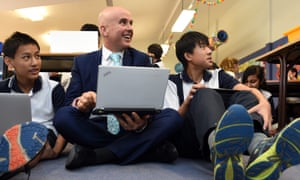
Peter Fray, the former Sydney Morning Herald editor and former deputy editor at the Australian describes the difference between the news organisations this way; “Working for the Australian reminded me of being at the SMH when the Fairfax family controlled it.
“In both instances, you felt you were part of a particular tribe where the norms and values were set by the chief and their key lieutenants. Of course, Tribe Fairfax is not Tribe Murdoch. The Oz is not the SMH. But as with any tribe there are set rules and rites, mostly unspoken.”
Another former News Corp insider described it as an aggressive, masculine culture although there are also women in News Corp’s executive and editor ranks.
“Alpha males are selected as editors. It’s a real big swinging dicks culture … With the editors it’s often about the relationship with Murdoch himself: who can be the ballsiest, toughest, cheekiest editor at the next editor’s conference in Belize or wherever.”
This year it will probably be Christopher Dore, the editor of the Daily Telegraph, after the paper claimed the scalp of the deputy prime minister, Barnaby Joyce, by revealing he had left his wife and was having a baby with his media adviser Vikki Campion.
Or perhaps it will be Paul Whittaker at the Australian for his diligence in pursuing the former prime minister Malcolm Turnbull over his energy policy.
The culture of News has been described by some past executives and former staff as “bullying” and “vindictive”. Some embrace it and become spear carriers for their editors – and usually rise up the ranks. Others struggle with what is expected of them and feel anguished about the agendas. Others persevere and navigate the culture to produce excellent in depth journalism.
Former News staff admit it is sometimes not about meeting audience needs or preferences but rather about pursuing editors’ own agendas.
“It’s a strange vision of what journalism is about,” one former senior News executive said.
Recent campaigns have included the Australian’s obsession with the Ramsay Centre for Western Civilisation – News Corp criticised the Australian National University for rejecting it (because the university considered what the centre wanted to be an unacceptable level of academic control). Other campaigns have fought the national energy guarantee, and a push by large investors to get more reporting from major corporations on progress on achieving gender diversity and measures they are taking to meet ethical obligations to be good corporate citizens.
The power of News at state level
In state politics, News’s style of journalism can have an even greater distorting effect on policy and politics. In Brisbane, Adelaide, Hobart and Darwin, News Corp owns the only metropolitan title. In New South Wales and Victoria, its tabloids have competition but are far more willing than other publications to use their clout.“What happened to me was disgusting, absolutely disgusting,” the former NSW education minister Adrian Piccoli said.
In 2012 the Daily Telegraph ran stories about the former Labor leader Nathan Rees having had an affair with a constituent. Piccoli, a National party frontbencher, was appalled at this incursion into the private life of another MP.
“They broke it with a front-page story and then followed up with a double-page spread, which named Rees’s wife and included photos of them both on their wedding day,” Piccoli said. “I thought they had treated the wife really appallingly. Rees had done the wrong thing in my view, but it was unfair to his wife.”
So a day later, Piccoli decided to speak up in parliament at the end of answering a question.
“I take this opportunity to express my sympathy to the member for Toongabbie and to his wife for the appalling way they were treated in the Daily Telegraph yesterday,” he said.
“I suggest there would be very few members of parliament, or indeed members of the media, who could put up their hand and say that they have a perfect personal life. I express my sympathies to Nathan and to his family. In my humble opinion, it is a personal matter and should remain that way.”

The Telegraph swung into action.
Shortly after his statement in parliament, he received an emailed list of questions from the Daily Telegraph: did he condone Rees’s actions? Does he condone people having sex in parks?
Soon after, as part of his duties as education minister, Piccoli went to Finland with the secretary of the department. “It was January! It was not a holiday. ‘Shock horror: education minister goes to the highest performing country to study their education system’,” he said.
“They sent a journalist and photographer to the airport when I was leaving. Then they sent a journalist to Finland with a photographer to take photos of me at a school. They took photos of me coming out of dinner in Helsinki – after dinner with the school principal.”
The photos made it to the front page of the Tele.
“I am just a state minister,” Piccoli said. “If it was a junket, fair enough, but it wasn’t.”
He said he was later told by another News Corp reporter he was “on a hit list” and that editors had encouraged her to follow up on stories.
In 2015 Piccoli faced more publicity in the Telegraph, this time for missing the first day of parliament when returning from a family holiday to Italy.
The Telegraph splashed with a report of the education minister’s “truancy”.
Andrew Clennell then political editor at the Telegraph, but now at the Australian rejected any suggestion by Piccoli of any campaign against him.
“We applied the same level of scrutiny to him as we did to other MPs in the NSW parliament and we had been writing critical stories about Mr Piccoli’s performance as education minister prior to 2013.”
Piccoli denies the Telegraph coverage was behind his decision to retire from politics. But the experience left him bruised. He now works in the education sector, promoting the Gonski reforms he supported during his period as minister – and which the federal Liberals had opposed.
‘The drop’ – demanding the news first
The News Corp mode of operating effects not just what the public knows, but also how state politicians shape policy.Advisers who have worked for state premiers describe how successive premiers were constantly trying to appease the News-owned tabloids and avoid drawing fire.
At the heart of the relationship is the longstanding practice by News Corp tabloids of demanding “drops” – exclusive access to the next day’s announcements. These are provided on the understanding that the journalist will not approach the opposition or any potential critics of the policy.
Imre Salusinszky was the Australian’s state correspondent between 2006 and 2013 and worked in the News Corp bureau in the bowels of state parliament in Macquarie Street.
“Most afternoons a senior Labor media staffer would go past my desk to the Tele with the next day’s policy announcement and they would gratefully take what was given to them,” Salusinszky said.
“At least since the Greiner years there has been this bizarre practice of this newspaper being singled out for the biggest juiciest stories. It was done so the government could get an uncritical treatment. But it also alienates other media, especially TV, at considerable political cost, so I have never understood it.
"I was the target of wheedling and bullying from the News Ltd tabloids when I did not provide enough drops"
When Mike Baird became premier, Salusinszky, who had joined his staff a year earlier, became media director. “I found myself managing the scheme,” he said. “And I was the target of wheedling and bullying from the News Ltd tabloids when I did not provide enough drops.”
“If you give them what they want, you get soft coverage, but then the TVs smash you up. If you don’t give them what they want, they smash you up themselves.”
After he left politics, Salusinszky wrote for Fairfax Media about the dirty little secret that has pervaded state politics in NSW, and no doubt in other states. It has also made its way to Canberra.
Salusinszky said he became extremely concerned about whether he was behaving in a proper manner.
“I started asking myself: ‘aren’t you in a position of doing special favours for a commercial enterprise? Aren’t they in a position where they are issuing inducements and threats to a government employee?’”
“I sought legal advice about whether I was in breach of the Icac act. I was told that I probably was.”
Salusinszky said the advice was verbal and the gist was that no conduct was allowed to interfere with a government employee acting in an impartial way.
But he met resistance from some ministerial offices when he started winding back the practice of “drops”, and more hostile reminders from the Telegraph when they bucked the system.
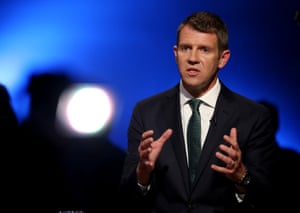
“Mike Baird has revealed he wants to emulate North Korean dictator Kim Jong-un by becoming the state’s Dear Leader with a plan to bypass traditional media such as newspapers, TV and radio and speak to his people using Twitter and Facebook,” the Tele told its readers.
It claimed Salusinszky had told a staff meeting that Twitter allowed Baird to have his own channel “like North Korea”, claiming it gave him increased reach across the electorate, a phrase that Salusinszky denied using.
“Clearly the Tele was upset,” Salusinszky said. “So I still wonder if what we did was in Mike’s interest. But I felt a government’s media operation should not be immune from the same ethical constraints as other areas – and my chief of staff entirely agreed.”
The system of drops continues and, in Salusinszky’s view, continues to distort policy and politics in NSW.
When asked about the practice of drops, News Corp responded with a statement.
“All decent reporters, regardless of employer, thrive on being first with the story,” it said. “But the real difference between News Corp reporters and many employed by its competitors are that the News’ journalists strive not to receive planted drops from ministers’ offices but to tell the stories that governments don’t want told or that media competitors are unable to confirm or are reluctant to report. There is no finer example of this in recent times than Sharri Markson’s exclusive revelation that Barnaby Joyce was in a relationship and expecting a baby with a former staff member. “
The practice has spread to federal politics. In his book The Rudd Rebellion, Kevin Rudd’s chief of staff, Bruce Hawker, records the machinations Rudd’s advisers went through when deciding where to release important reforms the Labor party was making to its internal rules. He recalls the then state secretary, Sam Dastyari, warning that the Telegraph’s Simon Benson would be cranky. (Even though it was dropped to News stablemate the Australian.) “Cranky was an understatement – Simon went ballistic,” he wrote. “Anyway I placated him and offered him a better story down the line.”
"The premier would be presented with a list of demands: projects that the Tele wanted the premier to adopt"
Over recent years the Telegraph has been an unapologetic champion for western Sydney, the heartland of its audiences. It has run Project Sydney 2018, Go West in 2016, Fair Go for the West in 2014. The usual drill is that the Telegraph would approach a premier with the plan for a campaign and outline how they would be the key speaker at the gala dinner later in the year and be feted in the Tele. So far so good.
But then the premier would be presented with a list of demands: projects that the Tele wanted the premier to adopt.
“Those ideas come out of a 10-minute add-on to news conference,” Salusinszky said. “You’re suddenly informed that we need to build a bridge from Parramatta to Neptune immediately.
“You look at the crazy list and give a few of the least crazy ideas to the bureaucrats to explore.”
But behind the scenes there is more going on. The Tele not only demands exclusives on the announcements, it uses its media campaign to sign up corporate sponsorship for its western Sydney campaign event.
It’s not alone. Increasingly events are becoming a major revenue stream for media companies.
“They bully the government into certain projects so they can beat their chests and show they can deliver outcomes,” Salusinszky said. “Then they bank it, in the form of corporate sponsorships. I think it’s another example of the dysfunctional relationship between tabloid media and the political class in NSW.”
News and the ballot box
But can News Corp actually sway elections?Rudd said he thinks the ability of News to drive the outcome of elections has waned because of the declining influence of print.
“I think that’s changed,” he said. “I think they had enormous power to do so closer to 2010. But with the social media revolution that has been much reduced.”
But he said that News’s preparedness to carry losses on its newsroom operations, while competitors slim down, means the Australian remains ubiquitous as a source of news in regional newsrooms around the country.
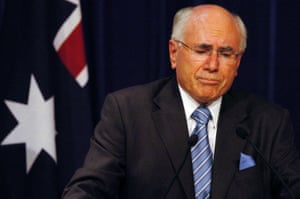
Rudd said News’ true colours were on display during elections.
“Every decade or so when it looks like the punters might be half interested in moving to a Labor government, they are more even-handed, but by and large the operating plan is to give Labor governments hell.”
And the best way to do that, Rudd said, was in denigrating the leader. Rudd said it was “continued open season” against himself, Gillard and now Shorten.
“They are serious muckrakers against Labor leaders,” he said. “A very simple barometer of that is to look at the period when Howard was in office. How often did News go after Howard about something to do with himself or his family?”
Howard would no doubt beg to differ.
In February 2000, Howard was attempting to finalise rules around the introduction of digital television and multiple channels and his decision was seen by the Murdochs as favouring Kerry Packer. The Tele splashed with “KPTV: coming soon to a $12,000 set top box near you.” KPTV was a reference to Kerry Packer, then owner of the Nine network.
But it was the other more personal stories that really riled Howard, including “PM’s son in death house”, a headline that bore little resemblance to the story that the prime minister’s son was at a house where a partygoer died but had no knowledge of the incident or involvement.
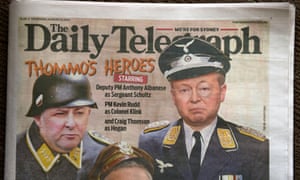
Howard managed to broker a truce and was the beneficiary of more
benign coverage until 2007, when the polls revealed that nothing was
going to save his 11-year-old government. News turned to Rudd but the
change of tone did not last long.
By the end of Rudd’s second stint as PM, News Corp recalled Col Allan from New York to run the 2013 election coverage. The infamous front-page editorial “Kick This Mob Out” left no doubt where the Tele stood.
“I saw how, on a daily basis, the storm of negative stories that emanated from News Corp papers blew our campaign off course,” wrote Hawker in the Rudd Rebellion. “Rudd was forced to deal with stories that had nothing to do with the issues either Labor or the Liberals were pursuing. This was the real damage those unending headlines in the Daily Telegraph and the Courier-Mail influenced on our campaign.”
ALP research on the bias by News found that the Daily Telegraph published twice the volume of unfavourable coverage on Rudd and Labor than the Sydney Morning Herald.
But did it yield results?
Brian McNair, a professor of journalism at University of Queensland, said voting patterns suggested that coverage such as News Corp front pages was less influential than some commentators expected.
The Daily Telegraph ran headlines of “ALP losing its heart” and “Exclusive: Labor facing western Sydney election wipeout”, suggesting that Labor would lose Reid, Werriwa, Lindsay, Greenway and Banks in a wipeout. It lost only three of those seats and six overall in NSW.
But when an organisation gets so big and powerful that politicians cower in fear, it also raises questions for democracies.
The answer most countries rely on is a diversity of voices and owners.
But that horse has well and truly bolted in Australia. With cross-media rules consigned to the dustbin of history, there is the potential for an already concentrated media industry to become even more concentrated.
All over the world there is concern about the ability of Murdoch to influence political debate.
“If there was no Murdoch media, the Trump phenomenon would not have unfolded,” Rudd said. “Fox provides an echo chamber for Trump voters.
“BSkyB and the Sun pursued a nativist campaign that gave rise to Brexit.
“When they are such a big swaggering monolith as they are, you can understand why people become frightened. That’s what I think is a sick thing in our democracy.”
By the end of Rudd’s second stint as PM, News Corp recalled Col Allan from New York to run the 2013 election coverage. The infamous front-page editorial “Kick This Mob Out” left no doubt where the Tele stood.
“I saw how, on a daily basis, the storm of negative stories that emanated from News Corp papers blew our campaign off course,” wrote Hawker in the Rudd Rebellion. “Rudd was forced to deal with stories that had nothing to do with the issues either Labor or the Liberals were pursuing. This was the real damage those unending headlines in the Daily Telegraph and the Courier-Mail influenced on our campaign.”
ALP research on the bias by News found that the Daily Telegraph published twice the volume of unfavourable coverage on Rudd and Labor than the Sydney Morning Herald.
But did it yield results?
Brian McNair, a professor of journalism at University of Queensland, said voting patterns suggested that coverage such as News Corp front pages was less influential than some commentators expected.
The Daily Telegraph ran headlines of “ALP losing its heart” and “Exclusive: Labor facing western Sydney election wipeout”, suggesting that Labor would lose Reid, Werriwa, Lindsay, Greenway and Banks in a wipeout. It lost only three of those seats and six overall in NSW.
A global concern
News leads the way in championing a media free of government interference and most media organisations would agree a free press is a hallmark of a democracy.But when an organisation gets so big and powerful that politicians cower in fear, it also raises questions for democracies.
The answer most countries rely on is a diversity of voices and owners.
But that horse has well and truly bolted in Australia. With cross-media rules consigned to the dustbin of history, there is the potential for an already concentrated media industry to become even more concentrated.
All over the world there is concern about the ability of Murdoch to influence political debate.
“If there was no Murdoch media, the Trump phenomenon would not have unfolded,” Rudd said. “Fox provides an echo chamber for Trump voters.
“BSkyB and the Sun pursued a nativist campaign that gave rise to Brexit.
“When they are such a big swaggering monolith as they are, you can understand why people become frightened. That’s what I think is a sick thing in our democracy.”
No comments:
Post a Comment